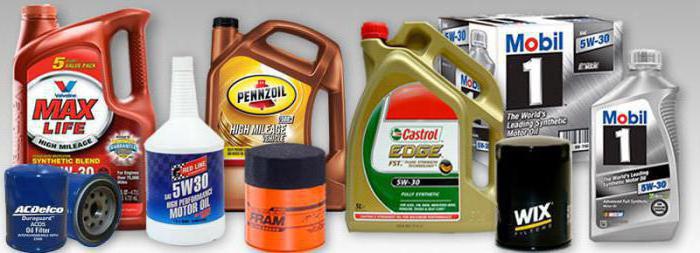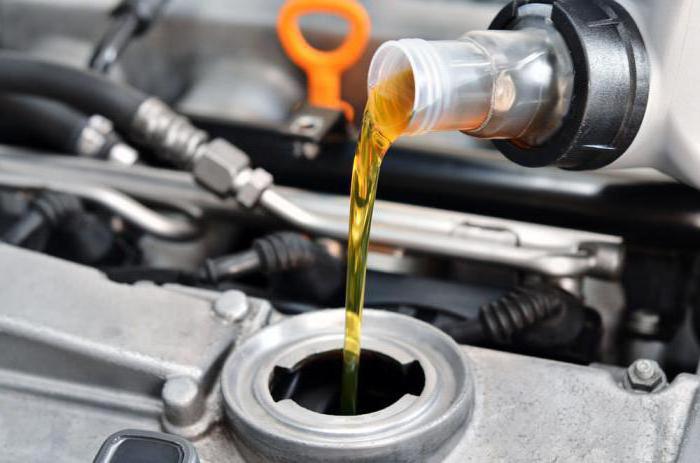Is it possible to mix motor oils: synthetics with synthetic or semi-synthetic?
On the road, the situations in which may be needed to be counted in the car of engine oil. What to do in this case? There is at least 2 options for solving the problem: ask someone to tow the car to the nearest one hundred and you can mix motor oils, adding what is in stock. What option to choose? What may be the consequences of mixing? Let's deal with.
Etymology
Let's start with synthetics. The basis of oil is an artificial product of oil and gas refining, which is obtained by synthesis. The derivation process itself is very complex, but quite effective. The molecular composition of such oils is so perfect that as a result of its impact on the parts of the car, there are no oxidative processes, as well as reactions with sealing rubber products. This engine oil is based on special additives that increase productivity and reduce fuel consumption. The only possible lack of such a product is its cost. Some craftsmen say that synthetic oil strongly stinks when the engine is working and goes to the avgar. It is reliable that it is unknown. Therefore, we will consider it in definite.

The semi-synthetic oil is based on two types of molecular composition substances: synthetic and mineral. If it is easier to speak, this is a mixture of two bases. It is important that there are no standards regulating the ratio of the bases in the semi-synthetic oil. Some good brands distribute the components as follows: 40% - synthetics, 60% - mineral base. However, this percentage is always elected to the discretion of the manufacturer, and some unscrupulous brands can leave the recommended proportions.

What oils for which engines are suitable?
So it is possible to mix perhaps no. After all, two foundations have different specifications. The semi-synthetic lubricant has a low viscosity indicator, has a small package of additives and higher oxidation. If you use such oil in winter, when the power of strong frosts, the motor start is hampered, compared to how the engine works on analogs with a synthetic basis. Also, the interval of the replacement of such oils is shorter. Possible plus semi-synthetic oil - low price.
Some experts recommend using semi-synthetic on old engines, the mileage of which exceeds 100 thousand kilometers. It will allow you to restore compression, losing microcracks and other defects. It is ideal for a motor with an installed turbine.
Synthetic - choice for new engines
As for the synthetic basis, it is recommended to fill it from scratch and use on new engines with a slight mileage. Such a liquid copes perfectly with high temperatures and has high resistance to its drops. It is possible to replace such an oil by 10 thousand kilometers of run, but after 30-35 thousand. A wide packet of additives used allows you to contain internal oil channels clean. Such an oil prevents the formation of a car, increases the potential of the engine and reduces gasoline consumption.

Perhaps now it is more clear to us whether it is possible to mix the synthetics with the semi-synthetic. Motor oils on these bases are intended for different engines. This means that it is impossible to mix them.
What will be when mixing motor oils?
When mixing two different bases, the reaction that occurred as a result of their incompatibility will be inevitable. This will lead to the formation of slags that clog oil channels and make it difficult to move the fluid on the engine. As a result, the motor is quickly wearing, and its service life is reduced. Organic lubrication has many chemical additives in its composition. They are necessary to protect the motor. The inorganic default basis contains additives. As a result, when mixing, you will get an excessive amount of chemistry, which will not benefit the engine.
When is mixed?
It is worth considering that neither one label has no official tolerance of the manufacturer to mix. Negative consequences will necessarily be, so no one will give good to such manipulation. But since the trouble suffered, and there is no other way out, then you can add some organic organics in the synthetic or vice versa. But after you do it, you need to immediately follow the nearest service station, and, and try not to turn the engine much. In the auto repair shop, you need to fully rinse the engine and pour the "native" oil recommended by the manufacturer.

So is it possible to mix motor oils with a light-up to the ambulance of the motor? This is allowed, but it is not recommended strictly. As for flushing, it should be done on a hundred using special means.
Is it possible to mix synthetics with synthetics?
Motor oils on a synthetic basis are less capric. However, there is no universal lubricant with one viscosity and one additive package. Each manufacturer makes its synthetics, which includes different additives. Mixing synthetic oils of different brands cannot exclude the incompatibility reaction. At a minimum, some additives may fall into the precipitate, which dramatically reduce the lubricating oil properties, make it more viscous. However, mixing oils on one basis is better than trying to mix different basics. However, it is necessary to ensure that the viscosity of lubricants is the same. Some drivers are interested, whether motor oils can be mixed 5W40 and 10W 40. It is undesirable to do so. The viscosity of these products is different.
Mixing lubricants are allowed with the same value of the last digits displaying the temperature mode at which their work will be the most correct. It is better to mix oil if they are from one brand. If there are different brands, you can only mix in order to increase the oil level and get to a hundred. All due to additives that use manufacturers. These components are almost always different, used together, they can conflict with each other and fall into the sediment.

Note that there are opposite opinions of Motorist Masters, who claim that oils on one basis can be freely interfered with each other, and no negative effect will have it. Perhaps this is true, however, you do not need to risk without extremely necessary.
If the situation occurs when it is necessary to add oil, Ideally, you need to call your dealer and find out what oil is allowed for mixing.
Finally
Now we finally figured out whether motor oils can be mixed. Do not do this, if there is another, a more conservative solution to the problem. When the track was needed to top up the lubricant, then it is better to try to tow the car to a hundred, where they can add "native" oil or to replace it fully. But if there are no alternatives, then leyte what is. But get to a hundred slowly, without loading the power plant. The main thing - now you know whether you can mix motor oils.














